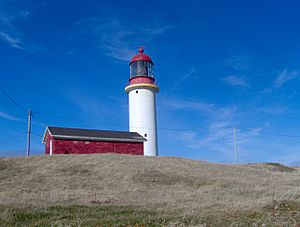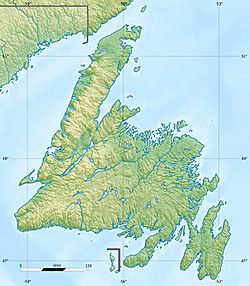Cape Race Lighthouse facts for kids
 |
|
| The second Cape Race Lighthouse from 1907 | |
|
|
|
| Location | Avalon Peninsula Newfoundland and Labrador Canada |
|---|---|
| Coordinates | 46°39′31.2″N 53°04′25.6″W / 46.658667°N 53.073778°W |
| Year first constructed | 1856 (first) relocated in 1980 to Ottawa at Canada Science and Technology Museum |
| Year first lit | 1907 (current) |
| Construction | concrete tower |
| Tower shape | cylindrical tower with balcony and lantern |
| Markings / pattern | white tower, red lantern |
| Height | 29 metres (95 ft) |
| Focal height | 52 metres (171 ft) |
| Original lens | Hyperradiant Fresnel lens by Chance Brothers |
| Range | 24 nautical miles (44 km; 28 mi) |
| Characteristic | Fl W 7.5s |
| Fog signal | Horn (2) 60s |
| Admiralty number | H0444 |
| CHS number | CCG 1 |
| NGA number | 1904 |
| ARLHS number | CAN-118 |
The Cape Race Lighthouse is an important lighthouse located at Cape Race on the Avalon Peninsula in Newfoundland and Labrador, Canada. This lighthouse helps guide ships safely along one of Canada's busiest shipping routes.
The light from the lighthouse flashes white every 7.5 seconds. When it's foggy, a loud foghorn sounds two blasts every 60 seconds to warn ships. Besides being a vital navigation aid, the lighthouse is also a popular place for tourists to visit.
Contents
History of the Cape Race Lighthouse
Building the First Lighthouse
In 1856, the British Government built the first lighthouse at Cape Race. It was made of cast iron and had a lamp that burned coal oil. A special clockwork system made the lamp turn. This was a big step for keeping ships safe.
Lighthouse Keepers and Canadian Control
A man named Patrick Myrick became the lighthouse keeper in 1872. His family continued to work at the lighthouse for over 100 years! This shows how important the Myrick family was to Cape Race. In 1886, the government of Canada took over running the lighthouse.
New Tower and Radio Station
In 1904, the Marconi Company set up a wireless radio station at the lighthouse. This allowed messages to be sent and received without wires.
The original cast iron tower was replaced in 1907. A new, strong concrete tower was built. It was about 29 meters (95 feet) tall. This new tower held a huge hyperradiant Fresnel lens. This special lens, made in England, could make a very powerful flash of light. It was so bright it was like one million candles! Lighthouses like Cape Race were often the first sign of land for ships crossing the Atlantic Ocean.
The Original Tower's New Home
After the new tower was built, the first cast iron lighthouse was moved. Today, you can see it in front of the Canada Science and Technology Museum in Ottawa. It's a cool piece of history!
The Titanic Connection
The Cape Race Lighthouse became famous in April 1912. Its radio station received the distress call from the Titanic as it sank. This was a very unusual event for radio technology at that time. It showed how important wireless communication was becoming.
A National Historic Site
Because of its long history and important role, the Cape Race Lighthouse was named a National Historic Site of Canada in 1975. This means it's a special place that helps tell Canada's story.
Modern Day Keepers
In 2006, David Myrick, along with Noel and Liam Myrick, helped with a special project. They gave wood from the lighthouse to the Six String Nation project. This wood became part of a unique guitar called Voyageur. It's a way to keep the lighthouse's history alive.
As of 2020, Clifford Doran is the current lighthouse keeper. He continues the important work of keeping the light shining for ships.
 | Toni Morrison |
 | Barack Obama |
 | Martin Luther King Jr. |
 | Ralph Bunche |


